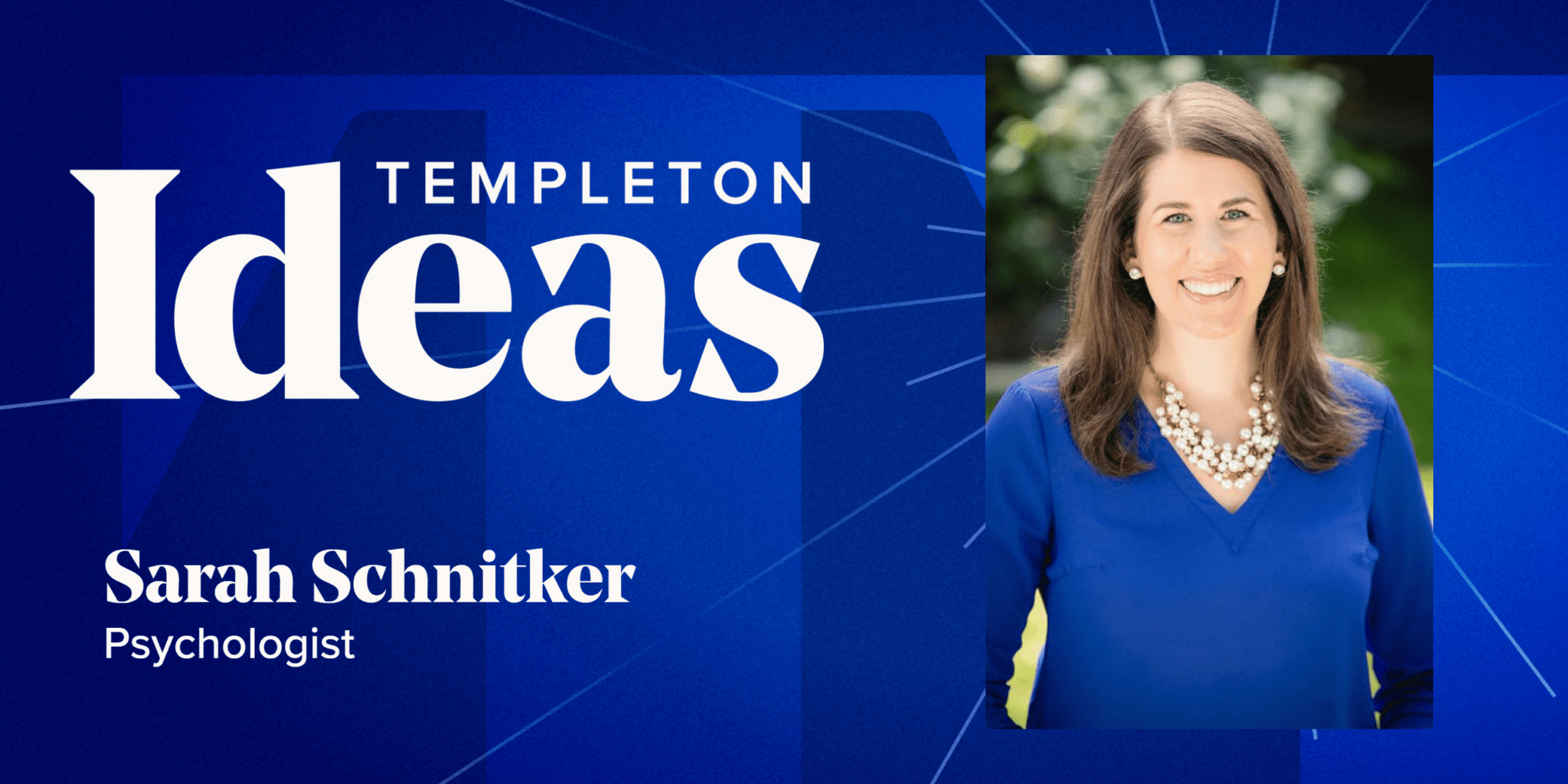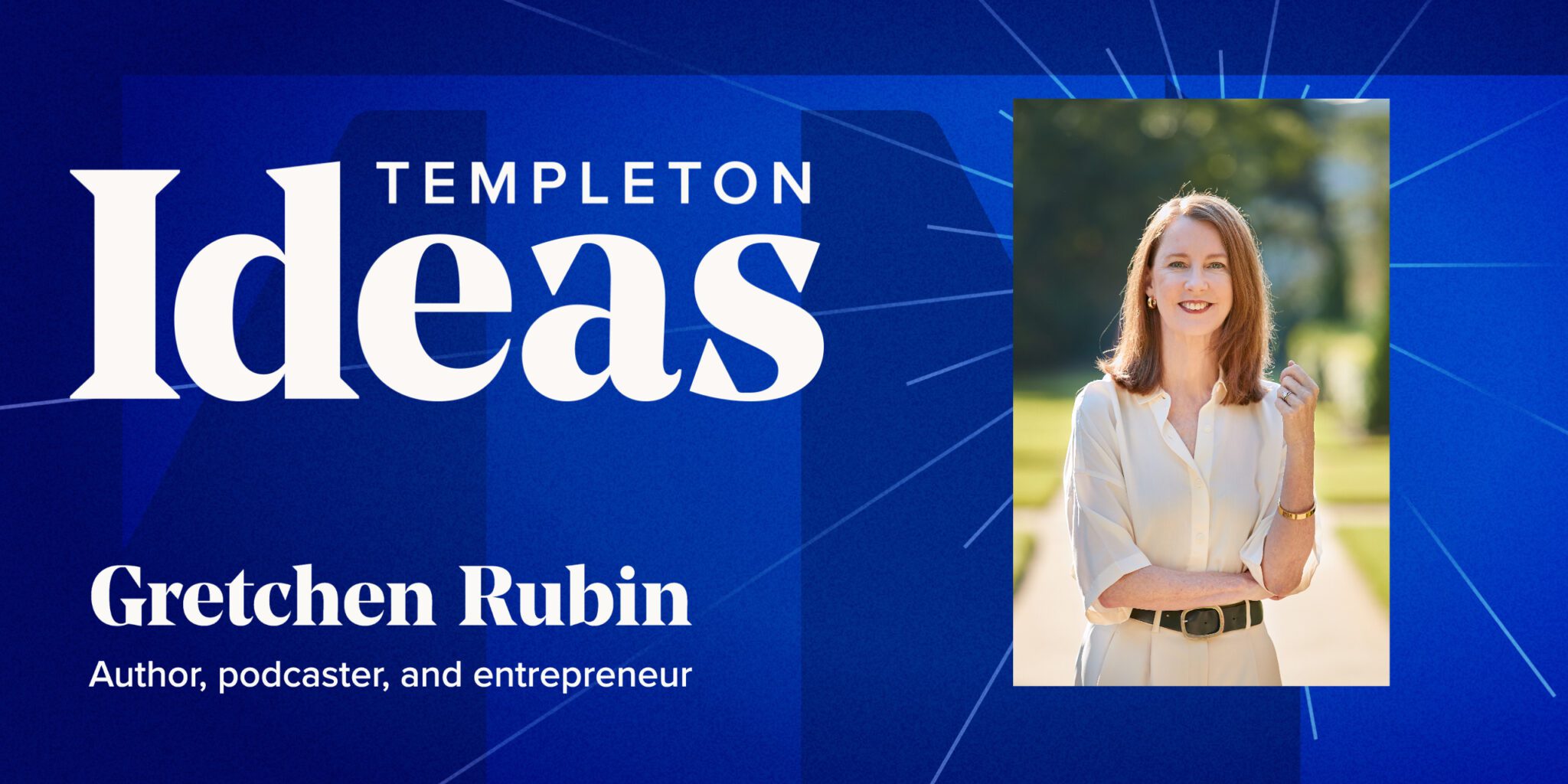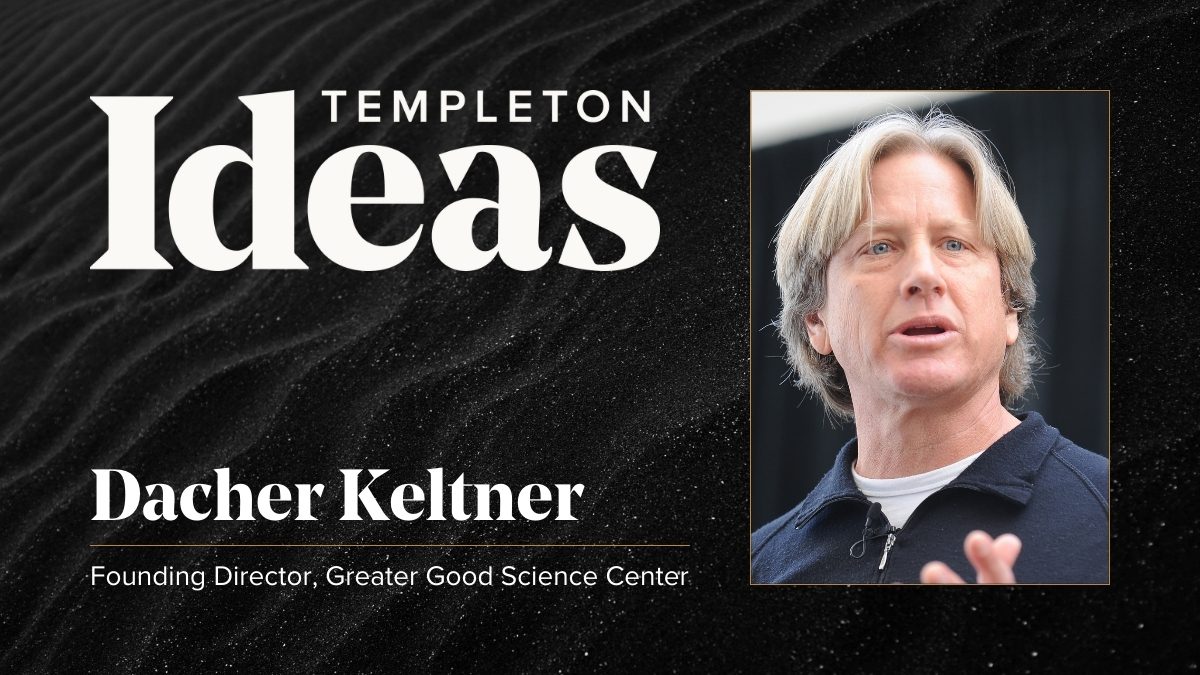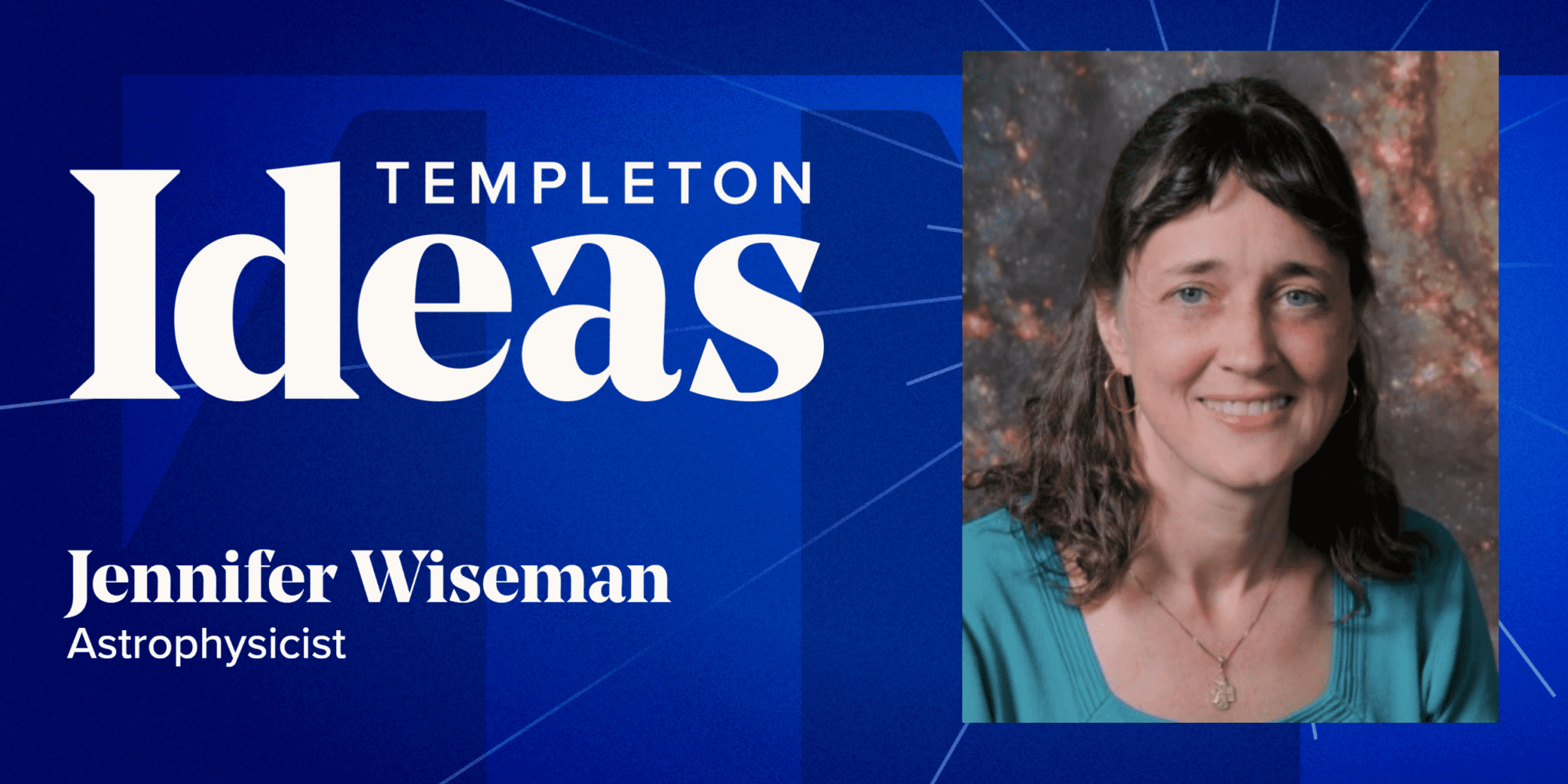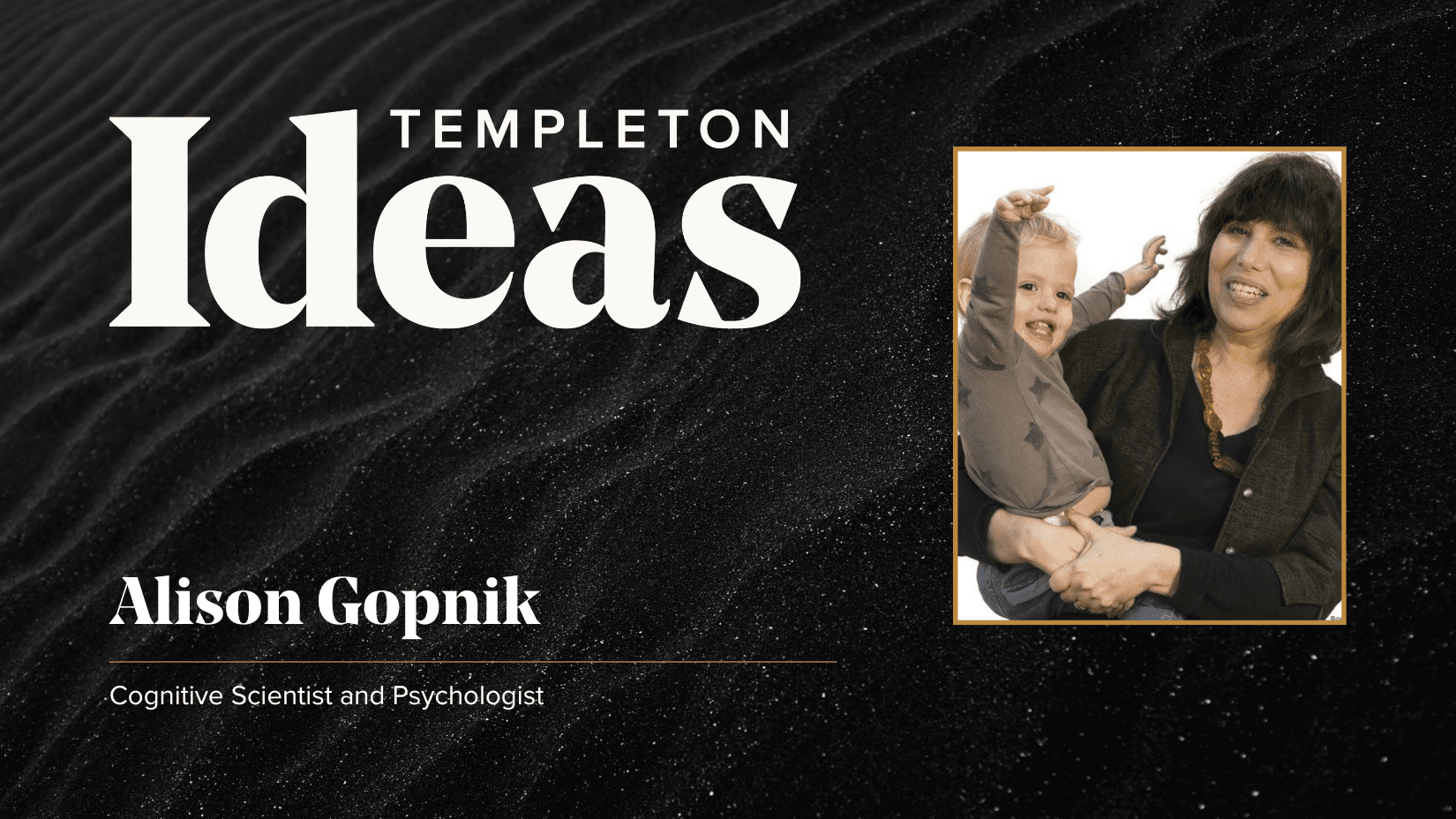The Templeton Ideas Podcast is a show about the most awe-inspiring ideas in our world and the people who investigate them.
Transcripts of our episodes are made available as soon as possible. They are not fully edited for grammar or spelling.
Dr. Sarah Schnitker is an Associate Professor of Psychology and Neuroscience at Baylor University. She studies character development and virtue formation in young people, specializing in the study of patience, self-control, gratitude, generosity, and thrift. Sarah joins the podcast to discuss the role of patience in our society, the difference between patience and passivity, and how narrative identity shapes our experiences — including her own experience with chronic illness.
THOMAS BURNETT: To start things off, I’d love to know, when you were growing up, what were you most passionate about learning about?
SARAH SCHNITKER: Well, when I was a child, it was hard. I loved a lot of different things. I loved math and science, but also stories of people’s lives and what makes a good person, and as a teenager in particular, I really started to kind of contemplate those big existential questions.
How do we develop things like virtues and kind of those perennial philosophical questions. And so it came to me when I took a psychology class in high school that I could study all the things I loved, I could use the methods of science, use my love of math and statistics, to study the big questions I really cared about. I think it’s pretty apparent from an early age that I was going to be a teacher or be a professor at the age of like 4, 5, 6. I would play school. I wasn’t really interested in dolls for taking care of them. They would be my students and so they get lined up. And once my brother was born, he had to be my student consistently, and just really always loved this process of teaching and learning and discovery. Yeah and then as an adolescent realized, ah, psychology is a place for me.
THOMAS BURNETT: Yes. Yes. You told me that you blazed through college in two and a half years and then spent a few months, maybe in Western Europe and in China. Can you tell me a little bit about that? What happened after you graduated? Cuz you were, what, 20 years old when you finish college?
SARAH SCHNITKER: I was technically, I was 19 when I graduated in December. I turned 20 pretty quickly after. So yes, I spent three months traveling through Western Europe, spent a couple weeks at the L’Abri Center, kind of engaging religion and Christian thought with different academic subjects. Spent some time studying there. Just wanted to get that exposure to different cultures, and for part of the trip I was with friends, but at least four of the weeks I was completely traveling alone. Which as a 20 year old, is a big step. And I really enjoyed that because being alone forced me to just talk to people and hear other people’s experiences.
THOMAS BURNETT: Did interacting in those different cultures, different people, cause you to challenge any of your own assumptions about what reality was, about who you are, what you valued?
SARAH SCHNITKER: You know, I would say definitely. I think for me, the thing that really struck me in both Western Europe and in China was that in the US in particular, we are so independent. And really focus on our accomplishments to find our worth and meaning. But in a lot of the countries I was in, and especially in that eastern cultural context, just the communal nature of being and viewing yourself. I mean I’d learned about this in psych 101 even, collectivists versus individualistic kind of approaches. But just really being in it and realizing kind of some of an over-focus on work that we have in this culture and achievement.
THOMAS BURNETT: Yeah. My experiences were similar. I lived in Spain with a host family when I was 17, and I was shocked to discover that achievement and success and doing things wasn’t the be all, end all of life.
Let’s pivot to your, to your areas of research. I’ve noticed that you specialize in studying virtues, like patience, self-control, generosity, gratitude. I mean, those are all features in which I can definitely notice I have a lot of room for improvement. I would say probably most of us do. And the question I have for you is, like, as a professional who studies this, can you just tell me how do we become better people? I mean, concretely, how do we do it? We know that we need to be better, in our interactions with others. We know our, usually our shortcomings, but there’s the, I wish I were better and then there’s the process of becoming better. So maybe tell me a little bit about how that works from what you’ve learned.
SARAH SCHNITKER: Yes. Well, I don’t know if this is helpful for people’s emotions or not, but even as someone who studies it, I constantly struggle with it myself. So I think the first thing is that it takes patience to become a good person and to really cultivate these virtues that it’s not a quick process. So, for example, the virtue of gratitude. There’s a variety of practices that have an evidence base that can make people more grateful.
So whether it’s gratitude journaling on a regular basis, or taking time to write letters and properly thank people from your past for how they have really influenced you and benefited you. Right. We have support for these kind of exercises for something like patience that might be learning some emotion regulation strategies and practicing those on the small things so that you can do it better on the big things. So there’s lots of specific hows, but the thing that we also need to cultivate is the why. Why do I want to be patient? Why do I care about being grateful, and really thinking about your big picture purpose in life. Fancy word we use sometimes in philosophy or in psychology is like your telos. Like what is the end goal of being a human? And not just like a small purpose, so I wanna be a professor, but like, what do I see as my ultimate purpose? What does it mean to exist as a human being in this world?
You know, there’s a variety of answers people can come to, but the ones that really help cultivate virtue involve something that’s bigger than yourself. So it can’t just be to become as rich as possible, and to personally have the most power or things like that. Those are not conducive to virtue development. It’s gonna be connecting your big why to something outside the self. I mean, I think it’s so interesting when I talk about my research, just people I interact with on the street. When I mention my work on patience, the most common response is like, oh, I don’t have any of that. Like, whereas other virtues, no one ever says, oh, gratitude, I suck at that. Or, oh, self-control. Oh yeah, that’s, that’s no good. I think one, people are correct that we struggle with this virtue in particular, but I think part of it is that we’ve also given up on even trying. We think that if we have to wait or suffer, that the solution is technological, that we need technological innovation to fix it, instead of something about ourselves and a human solution. And more of a virtue development is actually what’s necessary.
THOMAS BURNETT: Is there a specific definition that you’re working with, with patience in which you are studying it, trying to understand it, applying it?
SARAH SCHNITKER: I’d like to define patience as the ability to remain calm in the face of frustration, adversity, suffering, waiting as you’re pursuing your goals. And we talk about it at a virtue level, it’s pursuing goals that have moral ends. So patience is not the assassin being very calm as they wait to kill someone, but being able to remain calm in the face of a frustrating child having a temper tantrum, in the face of a chronic illness. And I think we, in our research and others as well, for example, Kate Sweeney, really think about patience in goal pursuit. We have somewhere we want to be and it’s taking a little bit longer or it’s a harder journey than we hoped for or anticipated. But we stick with it and remain calm during that process. When I define patience, there’s two things I wanna talk about what it’s not and kind of the two vices that surround it.
So patience is not passivity. That would actually be a vice. That when you see people start to disengage from the goal, they become so emotionally dysregulated that they have to give up. So that is no longer patience that is now a vice of excess for patience.
And also as we typically think, patience is. Not recklessness, that would be the other vice of pushing forward, recklessly, actively. So patience is staying in the middle place, and continuing with the goal, but calmly and without being unduly distressed. Not getting so dysregulated, you push ahead and harm others or the goal pursuit itself and not getting so overwhelmed by the emotion that you exit and no longer try.
THOMAS BURNETT: Yeah, very helpful. I mean, it also confirms where my patience is lacking, but that, yeah, laying it out explicitly I think is, is very helpful both in terms of like, it’s on a spectrum and you can go wrong either way.
SARAH SCHNITKER: The other thing that I think is really important is to think about patience in relation to other virtues. So, for example, courage needs to be the companion of patience in our work. That if we think about patience in the pursuit of social justice, for instance, and working towards justice in society, patience is often weaponized and people are told to be patient. What they’re actually being told is to be passive, and that is not patience.
Instead, patience is continuing to work forward for the sake of justice and love. And I think it's important to name that patience has been weaponized and that is not actually the virtue of patience.
What our research shows too, is that the types of patience that really matter are patience with other people. So it takes two hours to get the bedtime routine done with children and how to interact with children in child rearing. That’s a domain that every parent I talk to says how much patience it takes. With students, with coworkers, right, we really need to allow the time for relationships to form and mature and have our own patience kind of in the day-to-day interactions, but then that long term as well. And I do wonder if some of our crisis of loneliness that’s being discussed the last decade or two is cuz we’ve forgotten that fact and that we’ve lost the strength and really need to re-energize our patience. And, you know, I think a lot of the great religious traditions recognize this.
In Islam, patience is really emphasized. The Holy Month of Ramadan is all about patience in Christianity, right, one of the most famous New Testament text first Corinthians, love is patient is the first attribute listed. I mean, Buddhism, it’s about accepting that life is suffering. It’s all about patience. So we see a lot of our ancient traditions know that patience as essential, it’s just, we’ve kind of forgotten in our western , post-industrialized technological world.
THOMAS BURNETT: You actually anticipated a question I was gonna ask you, which specifically are there other virtues as well where you feel like religious communities have,special insights or, maybe even, ways of inculcating certain virtues in addition to patience?
SARAH SCHNITKER: Yes. I think, I mean, if you look at the positive psychology literature, around character strength and virtue development, it’s really interesting. A lot of the interventions that have emerged, that many are secular interventions, they often resemble a lot of spiritual practices, and actually, in some instances, we’re even kind of taken from those cultural goods that come from the religious practice. So, for example, mindfulness meditation comes from explicitly Buddhist religious thought, and tradition. And we see this over and over again. A lot of the interventions we develop, gratitude practice is prescribed in almost every religion, that is out there. That there are special prayers and ceremonies that all relate to gratitude.
Something my lab that we’ve actually been looking at for quite a few years, and a pressing question I have as a researcher is, when we take these activities that build virtues, what happens when we secularize them and remove them from their religious context? Are they equally effective? Is something lost? And some of our initial studies suggest it may be a problem when we secularize these spiritual practices that they lose something. So for example, we did a study a couple years ago, Kelsy Richardson, one of my grad students and I, where we looked at gratitude practice and we did an experimental manipulation where we assigned people once a week to write down the things they were grateful for and then read aloud the list to themselves. We had another condition where people wrote down the things for which they were grateful and read the list allowed to another person. And then we had a third condition where they wrote down their gratitude and read the list allowed to God in prayer. Right? Which is often the traditional way that gratitude was practiced. And what we found is that the practice was more potent for wellbeing when practiced as prayer. And this was in a religious population, so that was a meaningful activity for them. And I think it relates to the way we think about virtues, that you need the how and the why. So by doing this practice as a spiritual practice, it was connecting the activity itself to that bigger picture. That this is part of my ultimate kind of concerns of life, my spirituality and religion. And that is what we think was part of the extra potency there. And we’ve seen this in other studies as well.
We still find that secularized interventions that kind of come from religious traditions are still effective, more effective than other types of activities. But I think they are potentially most powerful when they are connected to that deep meaning system. Whether that’s explicitly religious or kind of someone’s idiosyncratic spirituality, I think it’s really essential that we not lose that spiritual component.
MIDROLL
THOMAS BURNETT: Sarah, I know some of your research focuses on the concept of narrative identity. Can you tell us exactly what this means?
SARAH SCHNITKER: The narratives people tell really predict who they become and their wellbeing and even their virtue. So if you think about the narratives from film or novels or TV shows, right, there’s different types of narratives that we have available to us in our culture. So some people see their life as a tragedy and just a downward slope. Other people see it as a comedy of hers. Some people see it as a story of redemption and overcoming obstacles. And what the research shows is that especially that narrative of around redemption in United States, Dan McAdams shows that that leads to more generativity, more generosity later in life and that certain narratives are more robust to kind of these meaning struggles because the story you tell of yourself is that, yes, I’m gonna face obstacles, but I overcome them or I learn things from them or they help me grow. If that’s kind of the ongoing story, those crisis points are less of a crisis because it makes sense in the bigger picture you tell. Whereas other types of narratives are not really having a well-developed narrative can also be a real problem that you don’t have a story to make sense of things that you’re dealing with.
THOMAS BURNETT: Well, I’d love to put you on the spot now. I wonder if you can tell me about your narrative identity and some of the most transformative, monumental experiences that have shaped how you see yourself.
SARAH SCHNITKER: Yeah, you know, I would definitely say my narrative involves a kind of overcoming struggle. In many ways. I was born with so many privileges and benefits, but a struggle I’ve experienced basically throughout my life is a lot of health problems and chronic illness. And those resolved a bit as an adolescent and college student. But then in graduate school I faced health challenges at a whole nother level.
About halfway through my PhD program, I became very, very ill. I started throwing up one day and basically didn’t stop for about six months. I lost tons of weight very quickly. Incredibly scary figuring out what is going on. And was probably in many ways, the most difficult time in my life.
And came to find out through working through doctors and seeing lots of different specialists, I was diagnosed with what is called cyclic vomiting syndrome, which is basically as horrible as it sounds. I have these episodes of getting very ill and it’s in my brain, so it’s nothing about my stomach. It’s like almost a migraine, but I don’t always get a headache.
There’s ways to manage it with medication and lifestyle and being very careful. I have to get eight hours of sleep. Like more than two days of that, I start throwing up so I have to have some serious kind of structure to my life. But this was also, you know, such a learning experience and continuing to have to deal with this. It never goes away. It was somewhat transformational in my view of myself and the world. And especially in relation to my research on patience and suffering to now have to embody this vir or try to embody this virtue and recognize in my own life and just the whole human condition that we are not always agents. It was such a difficult time. But that period of my life just also reinforced my vocation or calling of doing the kind of research on virtues like patience which are often not respected in this culture because they are about responsiveness instead of agency.
Yeah, so was kind of a real tipping point in my mid-twenties. Then the other, I guess the other big kind of change and shift in my life and my life as both a researcher and scholar and as a human being was becoming a mom.
Many women experienced serious nausea and problems during pregnancy. I had to get off some medications and so that was a really hard time for me, not only with my physical body, but also with some perinatal depression. But I think my experience of health concerns during pregnancy was a bit different than during grad school, cuz this time I was suffering for the sake of love for my daughter, and actually had something very tangible to hope for and when she was born, just saying how worth it that suffering was and how that experience that we do continually across our life often suffer for the sake of love and for the growth and development of other people. And even if that’s sacrificial, that it is worth it.
Yeah, so that was a really special time, a hard time, but coming out of it just had a renewed purpose and again, just made me committed to the type of research that really matters and helps people grow in their own patience and gratitude and courage and hope and generosity and so forth.
THOMAS BURNETT: I’m curious, emerging from that. Once you got past an acute period of the total helplessness of a child, how did your career change, how did you balance the ongoing responsibilities of being a mom? And I’m sure the very high demands of having a lab, having undergrads and grad students, you’re supporting, the publication pressures. How, how did you juggle that and, are there huge trade-offs?
SARAH SCHNITKER: Yes. I mean it’s really interesting when you look at my CV, my publications and grant, my career really actually, explodes and goes to a whole new level after I became a mom. Which is somewhat shocking to me. But I think I found that the meaning I found during that transition to parenthood and almost the laser sharp focus I had to develop in order to meet my academic goals just helped me to focus in and be very careful about what I choose to do, really prioritizing and saying my sleep and her feedings, that’s it for just a small season.
The other thing I need to say is that I also had a ton of social support. Both grandmas of my daughter were extremely involved. For four of the years I was living with my parents, we did an intergenerational household. I think that social support from the community can come in lots of different ways, but it is absolutely essential when engaging with caregiving for young children to have multiple sources of support from all of those people and neighbors and friends.
THOMAS BURNETT: I found the same. My wife and I live far from the grandparents and there is, this is a moment of overjoy when the grandparents come into town. Both for the kids and for us of having another pair of hands of feeling like you’re, you’re not doing it alone. Because there are some times of near despair of the two hour bedtime routine yeah, that having that intergenerational support, I feel like makes it possible and sometimes even enjoyable, when you have some of the little bit of backup. So.
SARAH SCHNITKER: Yeah, I think it was David Brooks who wrote a piece for the Atlantic a couple years, sometime during COVID, like saying the nuclear family was a failure or mistake. And just recognizing that what we’ve tried to do is maybe not what’s ideal.
THOMAS BURNETT: Yeah, that was a bold essay. I very much enjoyed reading that. It was like dropping a bomb.
SARAH SCHNITKER: Yes it was, I love that essay, it’s kind of true.
THOMAS BURNETT: I’m gonna pivot here. Question I’ve been eager to ask you. So in my limited knowledge of psychology, I gather that the field, historically, going way back, very male dominated with certain kinds. Questions and assumptions built in as the field in, as the field, maybe the last couple decades, has seen a higher proportion of women, maybe other ethnic minorities, entering the field, how have some of the maybe assumptions about human psychology changed? Perhaps some of the questions that people are asking. How does a field change depending on who is doing it?
SARAH SCHNITKER: That is a great question.
I mean, I think at a very broad level in psychology — when the feminist revolution took place, you see pretty soon after, the field actually caring about emotion and emotion driving morality and not just cognition.
Carol Gilligan kind of was a correction to Kohlberg’s view of morality that was all about reasoning and said actually an ethic of care is how women operate. Even the emergence of virtue ethics as a way of thinking about morality, it somewhat corresponds to more women entering these fields. I think even now In psychology of religion, in particular, is just the diversity of ethnic backgrounds and religious traditions that is starting to happen with new scientists coming to the field. So, for example, in my lab, we have Muslim researchers. We have kind of mainline protestants. We have more conservative evangelicals. Jesus Christ, of Latter Day Saints individuals. We have atheist agnostics all within our lab. Which just enrichens our science and helps us bring different viewpoints and allows us to collect different types of data. So, for example, we have been able to collect rather large samples. We had a study of 240 Muslim American adolescents looking at how Ramadan, this holy month of patience, actually cultivates patience and gratitude. These scholars really focus on the importance of that cultural context. I think we need that diversity in the field to push us in that direction.
THOMAS BURNETT: Following on that, does psychology have certain blind spots that you think there are some things here that you’d like to know about humans, but you feel like my tools at my disposal of psychology don’t get me there.
SARAH SCHNITKER: I have two answers. So the first is, as a psychologist, recognizing the limits of my methods. So, we can only get so far. We can’t make normative claims.
So claims using that in the philosophical sense of claims of what should be, who should humans become. That is outside the realm of psychological science and requires other disciplines like theology, or philosophy. So in my work I try to really recognize that science more tells us what is, and perhaps what can be and what works better or worse, but it really shouldn’t be setting the standard. And so we need to work with the philosophers, the religious leaders, the ethicists from different communities when we’re studying virtues to let them tell us what are the normative claims. What does this community say is the good life, is moral, et cetera. So I think that’s a limitation of our method. And if psychologists don’t explicitly recognize that, health and wellbeing become the end all. The absence of mental illness symptoms becomes the end goal. But that’s not really enough and we shouldn’t actually be making those types of claims.
The other big blind spot is how weird our samples are. That we’re really looking at a minority of the world when we do our research. And that our findings might be very different when you get into a more traditional hunter gatherer society or get into the global south. And there have been some really good movements to try to expand our science and do a good job of actually thinking about human beings around the world and to be much more constrained in what we say is a universal process and to not make the claim that, oh, yeah, college students represent all of the humans in the world, like that’s gone on way too much .
THOMAS BURNETT: With our very short time, we have remaining, I wanna pivot back to a personal question. I was curious, with your 19 year old self that graduated from college, if she were to look at you now what would she, what would she notice? What would she be surprised about? What would she be excited about?
SARAH SCHNITKER: Oh, that is a good question. I think she would be surprised by the relationships I have. I also think, I hope she’d be encouraged that some of those things that, you know, my 19 year old self really cared about, are still the main things I care about that today. So that there’s some real continuity in those big picture things that I’m aiming for. That’s pretty cool now that I reflect on it, that the big questions and the research questions I care about have not actually changed that much. But a whole community is pursuing those with me, and just be encouraged at that age that, oh, you’re not gonna have to do this alone.
THOMAS BURNETT: Yeah. Has your research on the virtues influenced your relationships and how you understand them and how you value them?
SARAH SCHNITKER: Oh, without a doubt. I, all of my relationships I have going on in my mind kind of constantly. And sometimes explicitly with the person. Am I creating an environment relationally that we can both be our best selves and demonstrate and cultivate with each other our character strengths? And yes, my poor spouse and daughter, I always am like, wait, this is a great opportunity to be patient yet again. Like enough already. But I think in the end they appreciate it and I hope so at least. They pretend to if nothing else.
CREDITS
ABBY PONTICELLO: Thanks for listening to Templeton Ideas! If you like what you’ve heard so far, follow us and leave us a review wherever you get your podcasts.
Our program was produced by Jakob Lewis with Great Feeling Studios. Our theme song is by Dan Burns.
Our staff includes Thomas Burnett, Abby Ponticello, Benjamin Carlson, David Nassar, Gerald Nelson, Alyssa Settefrati, and Juliette Plummer.
